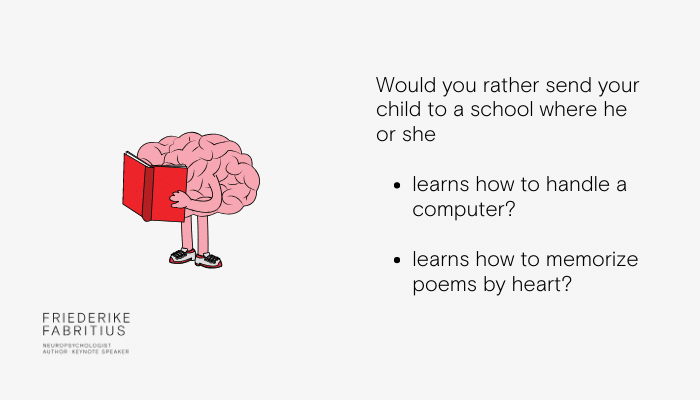Do we really need more digital learning?
Would you rather send your kids to a school where he or she learns the basics of handling a computer or to memorize poems by heart?
Ask most parents and they will choose option 1!
The newspapers are filled with politicians who advocate digital learning and parents all over the world demand more digital learning in schools to better prepare their children for a digital future. From a neuroscience perspective and as a mother of five, this makes me shudder. Let me explain why.
Do you remember Baby Einstein? Baby Einstein was the first company to make digital learning accessible to babies and toddlers. It was founded by stay-at-home mom and teacher Julie Dunn who “wanted her babies to be exposed to classical music, poetry, colors, shapes, and more”. Baby Einstein was a huge success. At its peak, one of three households with babies in the US had at least one of their products. When surveyed, 49 percent of parents thought that educational videos were important for child development. Julie Dunn was celebrated making first class education accessible to small children on the Oprah Show. The success of Baby Einstein was estimated to be nearly $400 million based on revenues.
Baby Einstein ended in one big messy lawsuit. Why? The idea that you can put your child in front of the TV and that it will become smarter is intriguing, but wrong.
As the New York Times puts it: “They may have been a great electronic baby sitter, but the unusual refunds appear to be a tacit admission that they did not increase infant intellect.”
So what exactly happens in our brain as we watch TV?
A team of researchers of Japan correlated hours of time spent watching TV with brain activity and IQ.
What did they find?
The more hours children spent watching TV, the worse they scored on an IQ test for verbal abilities. Even more so, researchers found changes in brain anatomy. They found thickening in the brain’s hypothalamus, septum, sensorimotor area, visual cortex, and frontopolar cortex. These regions are associated with visual processing, emotional responses, aggression, and language-based reasoning ability.
The changes in brain tissue occurred regardless of the child’s sex or age or his or her family’s income.
Of course, this was just a correlation and a correlation study does not allow for causal conclusion. Maybe the children just spent less time moving overall or spent less time interacting socially. We don’t know if the TV was to be blamed.
We also don’t know what shows the Japanese children were watching exactly. But I can’t help but wonder: Could it be that the more hours toddlers and baby spent watching “Baby Einstein”, the less intelligent and well-rounded they became?
I deliberately send my children to a school that bans cell phones and limits digital learning to a minimum. When I spoke to the head mistress about the decision to ban smart phones from the school she said:” It was so sad. When you saw the children on the school court, they were not playing anymore. They were all just busy with their smartphones.”
Is this really what we want for the next generation?
The medium by which you learn matters! It does matter whether you learn through a book or by watching a video.
That’s why within the next weeks I am going to write about how our brain reacts to digital media and what exactly happens in our brain as we read. I hope that this will help you to make more informed decisions. Just because something is popular, it doesn’t mean that it’s good for you. Or your child.
Sources:
TV study: Takeuchi H, Taki Y, Hashizume H, et al. 2015
Baby Einstein: Wikipedia. Interestingly, the information about the law suit is not to be found on Wikipedia, so check out the NYT article.
Baby Einstein law suit: https://www.nytimes.com/2009/10/24/education/24baby.html
